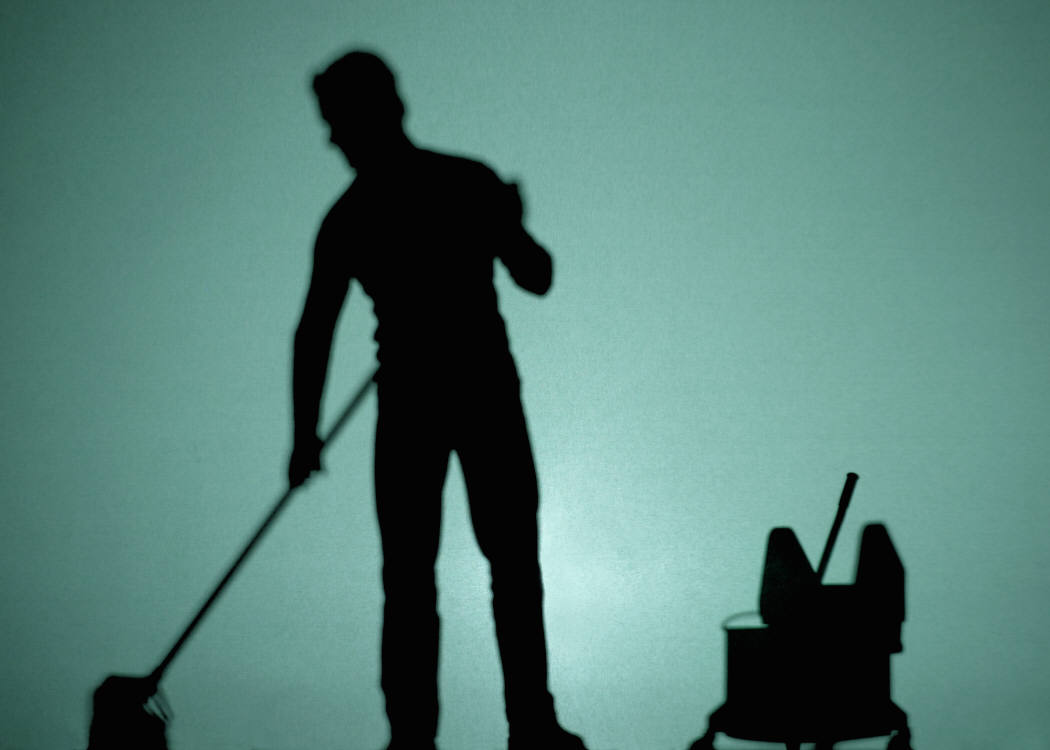Just a Janitor

I think the concept for stealth aircraft was based on the janitors at the United States Air Force Academy. As a group they were typically silent and practically invisible to the majority of cadets. The janitors quietly and diligently went about their jobs Monday through Friday cleaning after 100+ men and women living in a college dorm.
As individuals, the janitors were rarely acknowledged and their work even more so. The janitors took pride in their work mopping and buffing the floors, cleaning the bathrooms, emptying the garbage cans, and the messes we would thoughtlessly leave for them to clean up. As cadets, we were too busy getting ready for classes, parades, inspections and athletic events.
The janitors were supposed to be only distant, uninvolved observers when it came to cadet military training and activities. The janitor assigned to my squadron was in his 60’s, wore black horned rimmed glasses with thick lenses. A veteran his face was wrinkled and aged.
He was someone who easily blended into the woodwork. Our janitor did his job so well, none of us had to notice or get involved. After all, cleaning toilets was his job not ours. A grey haired relic working in a young person’s world. What did he have to offer us on a personal level?
I believe this perception of the janitors was shared by the majority of cadets. In 1976, this perception was changed permanently for one of the janitors. William “Bill” Crawford fit the profile for a janitor – unimpressive, slow moving, shy, soft spoken and buried in his work. Sadly, for many years cadets in his squadron gave him little notice, occassionally giving him a passing head nod or blurting a short, “Good morning.” Mr. Crawford was just another squadron fixture until one fall Saturday afternoon in 1976.
On that day, Cadet James Moschgat who later became Colonel James Moschgat was reading a book about World War II and the tough Allied ground campaign in Italy when he stumbled upon an incredible story. On Sept. 13, 1943, a Private William Crawford from Colorado, assigned to the 36th Infantry Division, was involved in some bloody fighting on Hill 424 near Altavilla, Italy.
The words on the page leapt out at the cadet:
in the face of intense and overwhelming hostile fire … with no regard for personal safety … on his own initiative, Private Crawford single-handedly attacked fortified enemy positions.” It continued, “for conspicuous gallantry and intrepidity at risk of life above and beyond the call of duty, the President of the United States …”
“Holy cow,” Cadet Moschgat said to his roommate, “you’re not going to believe this, but I think our janitor is a Medal of Honor winner.” They all knew Mr. Crawford was a WWII Army vet, but that didn’t keep his roommate from looking at Moschgat as if he were an alien. The cadets couldn’t wait to ask Bill about the story Monday morning.
When they met Mr. Crawford bright and early Monday morning and showed him the page in question from the book with anticipation and doubt on their faces. Mr. Crawford starred at it for a few silent moments and then quietly uttered something like, “Yep, that’s me.” Mouths agape, Moschgat and his roommate and looked at one another, then at the book, and quickly back at their janitor.
Almost at once they stuttered, “Why didn’t you ever tell us about it?” He slowly replied after some thought, “That was one day in my life and it happened a long time ago.” At that point, they were all at a loss for words after that. The two cadets had to hurry off to class and Bill had tasks to attend to.
However, after that brief exchange, things were never again the same around their squadron. Word spread like a virus among the cadets, they had a hero in their midst – Mr. Crawford, their janitor, had won the Medal of Honor! Cadets who had once passed by Bill with hardly a glance, now greeted him with a smile and a respectful, “Good morning, Mr. Crawford.”
Those who had before left a mess for the “janitor” to clean up started taking personal responsibility to put things in order. Most cadets now routinely stopped to talk to Bill throughout the day and the cadets even began inviting him to their formal squadron functions.
According to Moschgat, Bill would show up dressed in a conservative dark suit and quietly talk to those who approached him. The only sign of his heroics was a simple blue, star-spangled lapel pin. Almost overnight, Bill went from being a simple fixture in Moschgat’s squadron to one of their teammates.
Cadet Moschgat related Mr. Crawford changed too, but you had to look closely to notice the difference. After that fall day in 1976, he seemed to move with more purpose, his shoulders didn’t seem to be as stooped, he met their greetings with a direct gaze and a stronger “good morning” in return, and he flashed his crooked smile more often.
The squadron gleamed as always, but everyone now seemed to notice it more. Bill even got to know most of the cadets by their first names, something that didn’t happen often at the Academy. While no one ever formally acknowledged the change, Cadet Moschgat believes they became Bill’s cadets and his squadron.
Mr. Crawford continued work at the Academy and eventually retired in his native Colorado where he lived until his passing at the age of 81 on March 15, 2000.
A wise person once said, “It’s not life that’s important, but those you meet along the way that make the difference.” Bill Crawford taught Cadet Moschgat many invaluable lessons. Here are ten I’d like to share with you.
-
Be Careful of Labels. Labels you place on people may define your relationship to them and limit their potential. Sadly, and for a long time, the cadets labeled Bill as just a janitor, but he was so much more. Be cautious of a leader who callously says, “They’re just the stepdad/stepmom.”, “Hey, he’s just a kid.”, “She’s just a secretary.”, or “He’s just a waiter.”
-
Everyone Deserves Respect. Because they hung the “janitor” label on Mr. Crawford, the cadets often wrongly treated him with less respect than others. Mr. Crawford deserved much more, and not just because he was a Medal of Honor winner. Bill deserved respect because he was a janitor, working among the cadets, and was a part of their team.
-
Courtesy Makes a Difference. Be courteous to everyone around you, regardless of their rank or position. When the daily words to Mr. Crawford turned from perfunctory “hellos” to heartfelt greetings, his demeanor and personality outwardly changed. It made a difference for all of us.
-
Take Time to Know People. Life is hectic, but that’s no excuse for not knowing the people you interact with. For years a hero walked among the cadets at the Academy and they never knew it. Who are the heroes that walk in your midst?
-
Anyone Can Be a Hero. Mr. Crawford certainly didn’t fit anyone’s standard definition of a hero. He was just a private on the day he won his Medal. Don’t sell people short, for any one of them may be the hero who rises to the occasion when it’s called for. On the other hand, it’s easy to turn to your proven performers when the chips are down, but don’t ignore the rest of the team. Today’s newbie could and should be tomorrow’s superstar.
-
Leaders Should Be Humble. Alot of athletes and some political leaders are anything but humble. End zone celebrations and self-aggrandizement are what we’ve come to expect from sports greats. Not Mr. Crawford – he was too busy working to celebrate his past heroics. Leaders would be well-served to do the same.
-
Life Won’t Always Hand You What You Think You Deserve. As stepparents we work hard, make sacrificies, hard choices and, damm it, we deserve recognition, right? However, sometimes you just have to persevere, even when accolades don’t come your way. Perhaps you weren’t recognized on Father’s Day or Mother’s Day as you thought you should – don’t let that stop you. Pursue excellence; don’t pursue glory. Private Bill Crawford pursued excellence; he did his duty and then swept floors for a living.
-
No Job is Beneath a Leader. If a Medal of Honor winner, could clean toilets and smile, is there a job beneath your dignity? Think about it.
-
Pursue Excellence. No matter what task life hands you, do it well. Dr. Martin Luther King said, “If life makes you a street sweeper, be the best street sweeper you can be.” Mr. Crawford modeled that philosophy and helped make the cadet dorms a home.
-
Life is a Leadership Laboratory. People you meet everyday will teach you enduring lessons if you just take time to stop, look and listen. I spent four years at the Air Force Academy and 10 years on active duty, took dozens of classes, read hundreds of books, and met thousands of great people.
One definition of hero is a woman or a man with achievements and qualities we greatly admire. We can all think of heroes of prominence whom we honor significantly. They typically deserve our praise and our gratitude. The account of Bill Crawford reminds me and I hope you that we are likely surrounded by heroes who receive few if any public praise and little if any recognition for what they have done and do. If you’re a stepdad or stepmom you are considered a hero because you didn’t have to be but you choose to be anyway.
Please watch the following video and listen to the janitor’s first hand account about what happened during on day in1943. Also, please rate this post using the Stars and Thumbs below. Thank you.





